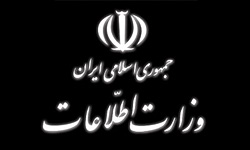US Congress Think Tank Hails Iran’s Intelligence Ministry

 A US Congress think tank described Iran’s intelligence ministry as the most active and most successful one in the Middle East in terms of conducting counterterrorism operations.
A US Congress think tank described Iran’s intelligence ministry as the most active and most successful one in the Middle East in terms of conducting counterterrorism operations.
The Federal Research Division of the Library of Congress in a 64-page report published in December wrote that with more than 30,000 officers and support personnel, the Iranian intelligence ministry is ranked by experts as one of the largest and most active intelligence agencies in the region.
It noted that the Iranian intelligence ministry uses all means at its disposal to protect Iran’s Islamic Revolution through arresting spies and exposing conspiracies deemed threatening as well as maintaining liaison with other foreign intelligence agencies.
The research institute then mentioned several instances of Iran’s intelligence ministry’s successful operations since the victory of the 1979 Islamic Revolution.
The ministry uncovered the Nojeh Coup, an attempt to overthrow the new post-revolution government by air force officers loyal to the former regime, in July 1980, it reminded.
The institute noted that the discovery of Nojeh Coup in 1980 is considered as one of the main operations of the Iranian intelligence apparatus after the revolution.
Even though the intelligence structure of Iran was young at the time, agents had discovered that a number of air force officers were plotting to overthrow the Islamic government.
It also pointed to the capture of the ringleader of the terrorist Jundollah group, Abdolmalek Rigi as one of the most successful operations by Iran’s intelligence ministry, which received widespread coverage both inside and outside Iran.
After Iran arrested Abdolmalek Rigi, the ringleader of Jundollah, in late February 2011, the criminal ringleader confessed that he was traveling to Bishkek to meet with a high-ranking US official at a nearby military base to discuss new terrorist attacks on Iranian territory. Rigi was executed in June 2011.
The notorious group had built a safe haven in Pakistan and it escaped to this Eastern neighbor of the Islamic Republic each time it staged a terrorist operation in Iran before it was disbanded and its leaders were arrested and executed.
In one of its latest operations in Iran, the Pakistani-based Jundollah terrorist group claimed responsibility for December 15, 2010 attack at the Imam Hussein Mosque in Iran’s Southeastern port city of Chabahar in Sistan and Balouchestan Province where people were commemorating the martyrdom of Imam Hussein (PBUH), the third Shiite Imam.
At least 38 mourners were killed and more than 89 others, including women and children, were injured in the attack.
The Jundollah group has claimed responsibility for numerous terrorist attacks in Iran. The group has carried out mass murder, armed robbery, kidnapping, acts of sabotage and bombings. They have targeted civilians and government officials as well as all ranks of Iran’s military.
In one of the worst cases, the terrorist group killed 22 citizens and abducted 7 more in the Tasouki region on a road linking the southeastern city of Zahedan to another provincial town.
In 2007, Jundollah kidnapped 30 people in the Sistan and Balouchestan province and took them to the neighboring Pakistan.
Jundollah claimed responsibility the same year for an attack on an Islamic Revolution Guards Corps (IRGC) bus in which 11 IRGC personnel were killed.
In another crime in October 2009, the Pakistan-based terrorist Jundollah group claimed responsibility for a deadly attack in the Sistan and Balouchestan province which killed 42 people among them a group of senior military commanders, including Lieutenant Commander of the IRGC Ground Force Brigadier General Nourali Shoushtari.







